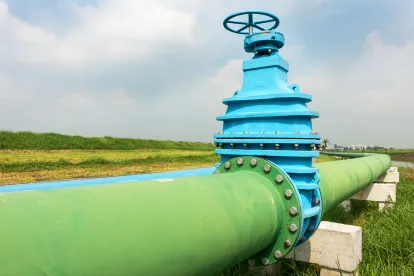PHMSA Partially Stays Enforcement of New Safety Standards for Underground Natural Gas Storage.
On June 20, the Pipeline and Hazardous Materials Safety Administration (PHMSA) issued a Notice advising of a partial stay of enforcement of its interim final rule (IFR) adopting safety regulations for underground natural gas storage facilities. The IFR requires that storage operators implement the mandatory and non-mandatory provisions of API Recommended Practices (RP) 1170 (Design and Operations of Solution-mined Salt Caverns used for Natural Gas Storage) and RP 1171 (Functional Integrity of Natural Gas Storage in Depleted Hydrocarbon Reservoirs and Aquifer Reservoirs). In January 2017, several trade associations filed a petition for reconsideration of the IFR. The Notice announced that PHMSA intends to address the petition in a final rule by January 2018. Until the final rule is issued and for one year after its publication, PHMSA will not initiate enforcement for failure to comply with non-mandatory provisions in the RPs. PHMSA, however, will enforce other IFR compliance deadlines, including the requirement that operators develop policies and procedures implementing mandatory provisions in the RPs by January 18, 2018. In addition, PHMSA has the authority to issue an emergency order or corrective action order if an underground gas storage facility is found to be an imminent hazard or if facility operations would be hazardous to life, property or the environment.
DOT Seeks Input on Impediments to Transportation Infrastructure Projects.
On June 8, the Department of Transportation (DOT) issued a Notice requesting input regarding existing policy statements, guidance documents, and regulations that stakeholders believe create regulatory and administrative burdens that unreasonably delay or impede transportation infrastructure projects. Although the focus of the Notice is on regulatory impediments, DOT also requests comments identifying recommended legislative changes. Comments are due by July 24.
OTHER PHMSA UPDATES
PHMSA’s Gas Pipeline Advisory Committee holds second meeting on proposed regulations for gas transmission and gathering pipelines. On June 6 and 7, PHMSA’s Gas Pipeline Advisory Committee (GPAC) convened the second of at least three meetings to discuss PHMSA’s notice of proposed rulemaking that would extensively modify Parts 191 and Part 192 of the federal pipeline safety regulations applicable to gas transmission and gathering pipelines. GPAC is a peer review committee established under the Pipeline Safety Laws and advises PHMSA on proposed safety standards, making recommendations regarding the “technical feasibility, reasonableness, cost-effectiveness, and practicability” of proposed standards. GPAC considered the following topics: corrosion control, integrity management, material verification, and records. The next GPAC meeting is expected in September.
PHMSA seeks nominations for members of technical advisory committees. On June 20, PHMSA issued a Notice requesting nominations for individuals to serve on GPAC and the Liquid Pipeline Advisory Committee (LPAC). PHMSA seeks individuals in executive level leadership positions from the Federal Government and industry, to fill vacancies on both committees. Nominations are due by July 5.
PHMSA Voluntary Information-Sharing System Working Group meets June 29-30. On June 15, PHMSA issued a Notice that its Voluntary Information-Sharing System (VIS) Working Group will meet on June 29 and 30 to continue discussions of the need for, and the identification of, a voluntary information-sharing system. The VIS Working Group, which was created pursuant to section 10 of the Protecting Our Infrastructure of Pipelines and Enhancing Safety Act of 2016 (Pub. L. 114-183), will discuss the following topics: mandate requirements, existing integrity management regulations, data types and tools, ILI repair methods, geographic information system pipeline data and operator implementation, potential subcommittee needs, past integrity management lessons learned, examples of existing information-sharing systems, and the potential need for additional expertise with committee membership. The meeting will not be webcast.
UPDATES FROM OTHER AGENCIES
DOT seeks comments on the renewal of information collection regarding procedures for transportation drug and alcohol testing programs. On June 16, DOT issued a Notice requesting comments on the proposed renewal of an information collection (IC) entitled, “Procedures for Transportation Workplace Drug and Alcohol Testing Programs.” The renewal request includes the DOT Drug and Alcohol Testing Management Information System (MIS) Data Collection Form used by PHMSA. Comments are due to the Office of Management and Budget (OMB) by July 17.
NTSB releases report on 2015 petroleum pipeline leak. On June 5, the National Transportation Safety Board (NTSB) released a report and recommendations regarding a September 2015 leak on a gasoline pipeline operated by Colonial Pipeline Company in Centreville, Virginia. The NTSB determined that the probable cause of the release was a crack at a dent in the pipeline. The NTSB recommends that: (1) PHMSA modify its pipeline dent acceptance criteria and require operators to either repair excavated dent defects or install a local leak detection system at each location where a dent is not repaired; (2) Colonial revise its dent excavation evaluation procedure; and (3) the Association of Oil Pipe Lines and the American Petroleum Institute communicate the NTSB’s findings to their members.
UPDATES FROM CAPITOL HILL
Legislation would impose more stringent liability and financial standards for pipelines that can discharge into Great Lakes. U.S. Senators Gary Peters (D-MI) and Debbie Stabenow (D-MI) introduced S. 1226, the Liability Insurance in Event of Spill Act, that would amend the Oil Pollution Act of 1990 to impose more stringent liability and financial standards on pipelines that could potentially discharge oil into the Great Lakes. The proposed bill also would authorize the Secretary of Transportation to issue emergency orders, without prior notice, directing pipeline operators to comply with existing pipeline operating agreements or acquire necessary resources to respond to an oil spill.
UPDATES FROM CANADA AND MEXICO
Canada and Mexico enter into Memorandum of Understanding to share pipeline safety experiences, lessons learned, and best practices. On June 13, Canada’s National Energy Board (NEB) and Mexico’s Comisión Reguladora de Energía (CRE) entered into a Memorandum of Understanding (MOU) providing for the sharing of information regarding liability and spill response regimes and compliance and enforcement framework and tools. The NEB will provide CRE with overviews of its Pipeline Safety Act, pipeline damage prevention regulations, and approach to assessing companies’ comprehensive management systems, and share its Safety Culture indicators, management systems manuals, and performance manuals.
SELECT UPDATES FROM STATES
CALIFORNIA
On June 15, the California Public Utilities Commission (CPUC) issued a decision establishing best practices and reporting requirements for its Natural Gas Leak Abatement Program, pursuant to California Senate Bill (SB) 1371. SB 1371 required the CPUC to adopt rules and procedures minimizing natural gas leaks from natural gas pipeline facilities and to repair leaks within three years of discovery. The decision requires operators to submit annual reports tracking methane emissions, implement 26 best practices for minimizing methane emissions, submit biennial compliance plans as part of the required Gas Safety Plans beginning in March 2018, and eliminate the backlog of leaks within three years. The decision also creates a cost recovery process to facilitate CPUC review of expenditures implementing best practices.
SOUTH CAROLINA
On May 26, the South Carolina Department of Health and Environmental Control amended its Underground Storage Tank (UST) Control Regulations to adopt the Environmental Protection Agency’s federal underground storage tank requirements in 40 C.F.R. Part 280 and revise portions of the state regulations regarding compliance requirements.
TEXAS
On May 22, Texas Governor Greg Abbott signed House Bill 1818, reauthorizing the Railroad Commission of Texas (TRC) until September 1, 2029. The bill requires that the TRC adopt damage prevention applicable to interstate and intrastate pipelines, implement alternative dispute resolution procedures for internal and external disputes and create an annual strategic plan for using its oil and gas monitoring and enforcement resources. The bill authorizes the TRC to establish pipeline safety and regulatory fees for permits or registrations for regulated pipelines.
VIRGINA
On May 29, Virginia’s State Water Control Board announced that Virginia’s Department of Environmental Quality will conduct a review of the Aboveground Storage Tanks and Pipeline Facility Financial Responsibility Requirements. The purpose of the review is to determine whether the regulation should be repealed, amended, or retained in its current form. Comments regarding whether the regulation is necessary for the protection of public health, safety, and welfare, minimizes the economic impact on small businesses, and is written in a clear and comprehensible manner are due by June 20.





 />i
/>i

